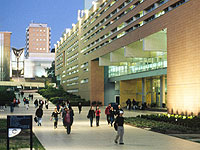Journalism and Communication - 8237
Program Summary
Faculty: Faculty of Arts and Social Sciences
Contact: sam@unsw.edu.au
Campus: Sydney
Career: Postgraduate
Typical UOC Per Semester: 24
Min UOC Per Semester: 6
Max UOC Per Semester: 24
Min UOC For Award: 72
Award(s):
Master of Journalism and Communication
View program information for previous years
Program Description
Students commencing prior to 2018 should refer to program 8232 Master of Journalism and Communication.
The Master of Journalism and Communication (MJC) provides its graduates with a professionally relevant and academically rigorous education in journalism, media and communication. Students will acquire a portfolio of skills in media practice, equipping them for work in print, radio, television and online media, and in the media relations and corporate communication sectors. Students will develop a knowledge of the social, economic and political role of media in Australia and internationally, and will gain an understanding of the evolving nature of the convergent media landscape. They will also develop critical thinking and research skills, equipping them for practice as ethical, critically reflective media professionals. Course content draws on the work of international scholarship on journalism, media and communication, and students are encouraged to reflect on varied international approaches to media and communication practice.
The specialist knowledge and professional skills taught in this program are framed by an interdisciplinary inquiry into the social, cultural, economic and political role of journalism, media and communication, on a local and global level. Students are encouraged to think critically about media practice and production, and to develop a capacity for reflective and ethical decision making. Students learn in a range of settings including seminars, lectures, tutorials, intensive workshops and online learning environments. Emphasis is placed on independent problem solving, and assessments supporting this approach include both formative and summative components. Graduates will have an advanced knowledge of the field of contemporary journalism, communication and/or media studies; and will be able to apply this knowledge to their media, communication and journalism practice in different contexts and settings.
There is an emphasis on the research/teaching nexus, and students are encouraged to apply insights from contemporary media scholarship to current and evolving issues in media technology, ethics and practice. Community engagement is promoted both within the theoretical content of the courses, and within assessment tasks that may involve cooperative partnership with NGOs and industry organisations. Students will also be able to choose either or both the research or/and practice pathways at the Advanced Disciplinary level.
Program Objectives and Graduate Attributes
Program Learning Outcomes
Graduates will have an advanced knowledge of the field of contemporary journalism, communication and/or media studies; and will be able to apply this knowledge to their media, communication and journalism practice in different contexts and settings.
Graduates will have developed a sound grasp of scholarly research practices in the field of journalism, communications and/or media studies, and in the applied fields of journalism, communication and media research.
Graduates will have developed high quality critical thinking and problem solving skills in both scholarly and professional journalism, communication and media contexts.
Graduates will be able to communicate complex ideas to a range of audiences, using written, oral and mediated communication, undertake both independent and collaborative enquiry, apply technical journalism and communication skills, and be adaptive, reflective learners and practitioners.
Graduates will have an understanding of both local and global issues in the field of journalism, communication and/or media studies.
Career Opportunities
Recent graduates have been employed in a range of roles encompassing communications, journalism, marketing and client relations, and digital media production.
Entry Requirements
- Honours degree or Graduate Diploma* (or equivalent qualification) in a relevant discipline with a record of academic achievement equivalent to a UNSW credit average of 65%
- Bachelor degree (or equivalent qualification) in a relevant discipline with a record of academic achievement equivalent to a UNSW credit average of 65%, plus one year relevant professional experience
- Bachelor degree (or equivalent qualification) in a relevant discipline with a record of academic achievement equivalent to a UNSW credit average of 65%
- Bachelor degree (or equivalent qualification) in any discipline with a record of academic achievement equivalent to a UNSW credit average of 65%, plus one year relevant professional experience
- Honours degree or Graduate Diploma* (or equivalent qualification) in any discipline with a record of academic achievement equivalent to a UNSW credit average of 65%
- Arts, Humanities, Social Sciences
- Media, Communications, Journalism, Public Relations, Advertising, Marketing
- Business, Economics, Commerce
- Law
*it is expected that a Graduate Diploma will have been completed after an undergraduate degree.
Credit Transfer
Award with Excellence
Program Structure
- Advanced Disciplinary Courses (12 - 18 UOC)
- Prescribed Electives (30 - 36 UOC)
- Cognate Courses (24 UOC)
- Advanced Disciplinary Courses (12 - 18 UOC)
- Prescribed Electives (30 - 36 UOC)
This course ARTS5505, can be taken as an additional course but will not count towards your program.
Academic Rules
- Enrol in the Master of Journalism and Communication and complete 48 UOC
- Complete 12-18 UOC Advanced Disciplinary Courses
- Complete 30-36 UOC Prescribed Electives
- Enrol in the Master of Journalism and Communication and complete 72 UOC
- Complete 24 UOC Cognate Courses before enrolling in Advanced Disciplinary Courses
- Complete 12-18 UOC Advanced Disciplinary Courses
- Complete 30-36 UOC Prescribed Electives
Fees
Pathways to further study
Area(s) of Specialisation










